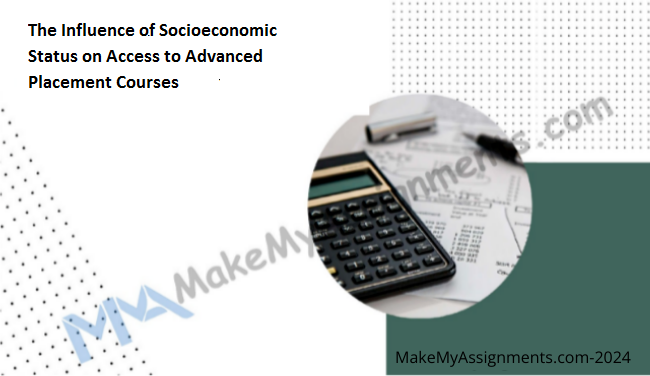
The Influence of Socioeconomic Status on Access to Advanced Placement Courses
In the landscape of education, the concept of equal opportunity often clashes with the stark reality of socioeconomic disparities. While educational institutions strive to provide all students with an equitable chance to excel, the influence of socioeconomic status (SES) on access to educational resources cannot be ignored. One crucial area where this influence is evident is in the realm of Advanced Placement (AP) courses.

The Promise of Advanced Placement
Advanced Placement courses offer high school students the opportunity to engage in college-level coursework and potentially earn college credit. These courses are designed to be challenging, offering rigorous academic content and preparing students for the demands of higher education. Successful completion of AP courses and exams can enhance college applications, provide an advantage in college admissions, and even lead to substantial cost savings by reducing the number of credits needed for graduation.
The Barrier of Socioeconomic Status
However, the accessibility of AP courses is not uniform across different socioeconomic groups. Students from affluent backgrounds tend to have greater access to these courses, while those from lower-income families often face barriers. Several factors contribute to this disparity:
- School Resources: Schools in affluent areas often have more resources to offer a wide array of AP courses. They may have well-funded AP programs, experienced teachers, and access to supplementary materials. In contrast, schools in low-income areas may struggle with limited resources, making it challenging to offer AP courses or maintain their quality.
- Preparation and Support: Students from higher socioeconomic backgrounds may have access to additional preparation and support for AP courses. This could include tutoring, test preparation resources, and parental involvement. Conversely, students from lower-income families may lack access to such support systems, making the prospect of enrolling in AP courses daunting or unattainable.
- Perceived Barriers: Socioeconomic factors can also influence students’ perceptions of their own capabilities and the feasibility of taking AP courses. Students from disadvantaged backgrounds may internalize societal messages that suggest they are not suited for rigorous academic challenges, leading them to opt-out of AP courses even when they have the potential to succeed.
Addressing the Disparity
To bridge the gap in access to AP courses and ensure equitable opportunities for all students, concerted efforts are needed at various levels:
- Equitable Funding: Schools serving low-income communities require adequate funding to offer a robust selection of AP courses. Increased investment in these schools can help provide the necessary resources, including qualified teachers, course materials, and infrastructure.
- Support Programs: Implementing support programs that specifically target students from underprivileged backgrounds can help level the playing field. This may involve offering free or subsidized tutoring, mentorship programs, and college readiness workshops to build confidence and academic skills.
- Teacher Training and Diversity: Ensuring that teachers are adequately trained to teach AP courses is essential. Additionally, promoting diversity among AP teachers can help create a more inclusive learning environment where students from diverse backgrounds feel represented and supported.
- Outreach and Awareness: Schools and educational organizations should actively engage with students and families to promote awareness of the benefits of AP courses and dispel myths about who can succeed in these classes. Providing information sessions, outreach events, and targeted communications can help demystify the AP experience and encourage greater participation.
- Policy Initiatives: Policymakers play a crucial role in shaping education policy and allocating resources. Advocating for policies that prioritize equity in education funding, teacher recruitment, and access to advanced coursework can help address systemic inequalities.
In the pursuit of equitable access to Advanced Placement courses, MakeMyAssignments (MMA) stands as a beacon of support for students from all socioeconomic backgrounds. Recognizing the systemic barriers that hinder access to AP courses for many students, MMA is committed to empowering students and leveling the playing field through a range of comprehensive support services.
1. Affordable Academic Assistance: MMA understands that not all students have equal access to expensive tutoring services or test preparation materials. Therefore, MMA offers affordable academic assistance tailored to the needs of students seeking to excel in AP courses. From subject-specific tutoring to comprehensive exam preparation, MMA provides accessible support to help students thrive academically.
2. Personalized Guidance and Mentorship: Navigating the complexities of AP courses can be daunting, especially for students who lack adequate support systems. MMA offers personalized guidance and mentorship programs to help students from diverse backgrounds navigate their AP journey with confidence. Whether it’s advice on course selection, study strategies, or college readiness, MMA’s mentors are dedicated to empowering students every step of the way.
3. Access to Quality Resources: Students from low-income communities often face limited access to quality educational resources, including textbooks, practice exams, and supplementary materials. MMA addresses this gap by providing students with access to a wide range of high-quality resources essential for success in AP courses. Through MMA’s platform, students can access study guides, practice tests, and instructional videos to supplement their learning and enhance their academic performance.
4. Community Engagement and Support: Building a supportive community is integral to overcoming the challenges associated with socioeconomic disparities in education. MMA fosters a supportive online community where students can connect with peers facing similar challenges, share resources, and provide mutual support. By creating a sense of belonging and camaraderie, MMA empowers students to overcome obstacles and achieve their academic goals.
5. Advocacy for Equity in Education: Beyond individual support services, MMA is committed to advocating for equity in education at a systemic level. MMA actively engages with policymakers, educational institutions, and community stakeholders to raise awareness of the barriers faced by students from underprivileged backgrounds and advocate for policy changes that promote equal access to AP courses. Through advocacy and collaboration, MMA seeks to create a more inclusive and equitable educational landscape where every student has the opportunity to thrive.
In conclusion, MakeMyAssignments plays a pivotal role in supporting students from all socioeconomic backgrounds in accessing and succeeding in Advanced Placement courses. By providing affordable academic assistance, personalized guidance, access to quality resources, fostering community engagement, and advocating for equity in education, MMA empowers students to unlock their full potential and achieve academic excellence, regardless of their economic circumstances. With MakeMyAssignments by their side, students can embark on their AP journey with confidence, knowing that they have the support they need to succeed.



